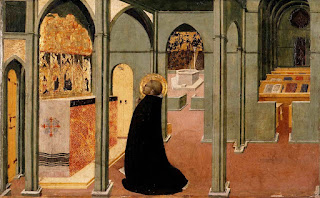"A way mystical and supernatural": the priest as theologian
There is no, it seems to me, better way to do that than to be a priest in the Church.
This, of course, does not deny that there other ways which are as equally good and proper: the lay theologian in the academy or the lay theologian in the service of the Church. It does, however, suggest that the office and work of the priest is inherently caught up with the vocation of the theologian.
The vocation of the theologian in this context is not to publish but, rather, to take seriously the stuff of theology, what Thomas Aquinas calls sacra doctrina. And it is Thomas who provides us with the key definition of theology at the outset of Summa Theologiae:
It was necessary for man's salvation that there should be a knowledge revealed by God besides philosophical science built up by human reason (ST I.1.1).
Or, in the words, of Hooker:
the doctrine that teacheth salvation by Jesus Christ, Evangelium aeternum (LEP I.15.3).
There are three particular ways in which we might identify how the office and work of priest is inherently and necessarily a vocation to be a theologian.
Firstly, the ministry of the priest is lived out within and defined by sacra doctrina:
Will you give your faithful diligence always so to minister the Doctrine ... of Christ, as the Lord hath commanded, and as this Church hath received (The Ordering of Priests, 1662).
What has been "received" is the Tradition, paradosis, the body of doctrine given by Christ in the Scriptures and read, interpreted by, and handed on in the one, holy, catholic, and apostolic Church. To minister as a priest, therefore, is necessarily to be theologically engaged, to have received, to drink deeply from, and to be passing on the rich, joyful, saving wisdom of sacra doctrina.
Secondly, the discipline of the Daily Office provides the day-by-day engagement with the deposit of faith, with "that which is committed to thy trust" (I Timothy 6:20). Thomas begins his definition of sacra doctrina by declaring that it is an unfolding of Scripture:It is written: "All Scripture, inspired of God is profitable to teach, to reprove, to correct, to instruct in justice." Now Scripture, inspired of God, is no part of philosophical science, which has been built up by human reason. Therefore it is useful that besides philosophical science, there should be other knowledge, i.e. inspired of God (ST I.1.1).
This is central to Cranmer's account of the purpose of the Daily Office:
The first original and ground whereof if a man would search out by the ancient Fathers, he shall find, that the same was not ordained but of a good purpose, and for a great advancement of godliness. For they so ordered the matter, that all the whole Bible (or the greatest part thereof) should be read over once every year; intending thereby, that the Clergy, and especially such as were Ministers in the congregation, should (by often reading, and meditation in God's word) be stirred up to godliness themselves, and be more able to exhort others by wholesome doctrine.
This twice daily encounter with the Scriptures - reading and meditating upon Scripture at Mattins and Evensong - is, for Thomas and Cranmer, theology in the raw. The "principle points" of sacra doctrina are, as Hooker reminds us, "deduced ... out of scripture by collection" (LEP I.14.2): the daily reading of and meditation upon the Scriptures at Mattins and Evensong calls and enables the priest to gather up "many deep and profound points of doctrine" (I.13.3).
Thirdly, at the Eucharist, the priest, in Cranmerian rites, preaches after the Gospel and Creed; in contemporary rites, after the Gospel and before the Creed. The former demonstrates that the priest's preaching flows from and is dependent upon the solemn profession of the faith of the Church Catholic; the latter demonstrates that the priest's preaching must flow into and cohere with the solemn profession of the faith of the Church Catholic. It is this which declares to the priest and the faithful that the priest is not to "preach any other gospel ... than that ye have received" (Galatians 1:9).
Preaching immediately after or immediately before the Creed, therefore, requires the priest to be rooted in the theological truths of the Church's fundamental doctrinal confession: the Trinity and the Incarnation, the Person of Our Lord Jesus Christ, the Paschal Mystery, the Person and work of the all-Holy and life-giving Spirit, the nature of the Church as catholic and apostolic, and the eschatological hope. Of this Hooker declares, in Thomas-like fashion, "God hath revealed a way mystical and supernatural", a way not known to "the light of nature", an "impossibility" for nature to discern without revelation (I.11.5-6). The priest preaching at the Eucharist, after or before the Creed, must therefore be a theologian, a student and teacher of sacra doctrina.
Boersma is correct: there is no better way to do theology. Other ways? Of course, yes. Other ways as equally good and faithful? Some, yes indeed (and some certainly not). Better? No. For the priest is called to embody in life, prayer, and teaching, the vocation of the theologian: the one who is called to attend to and unfold the sacred doctrine revealed in the Scriptures and passed on by the Church Catholic.





Comments
Post a Comment